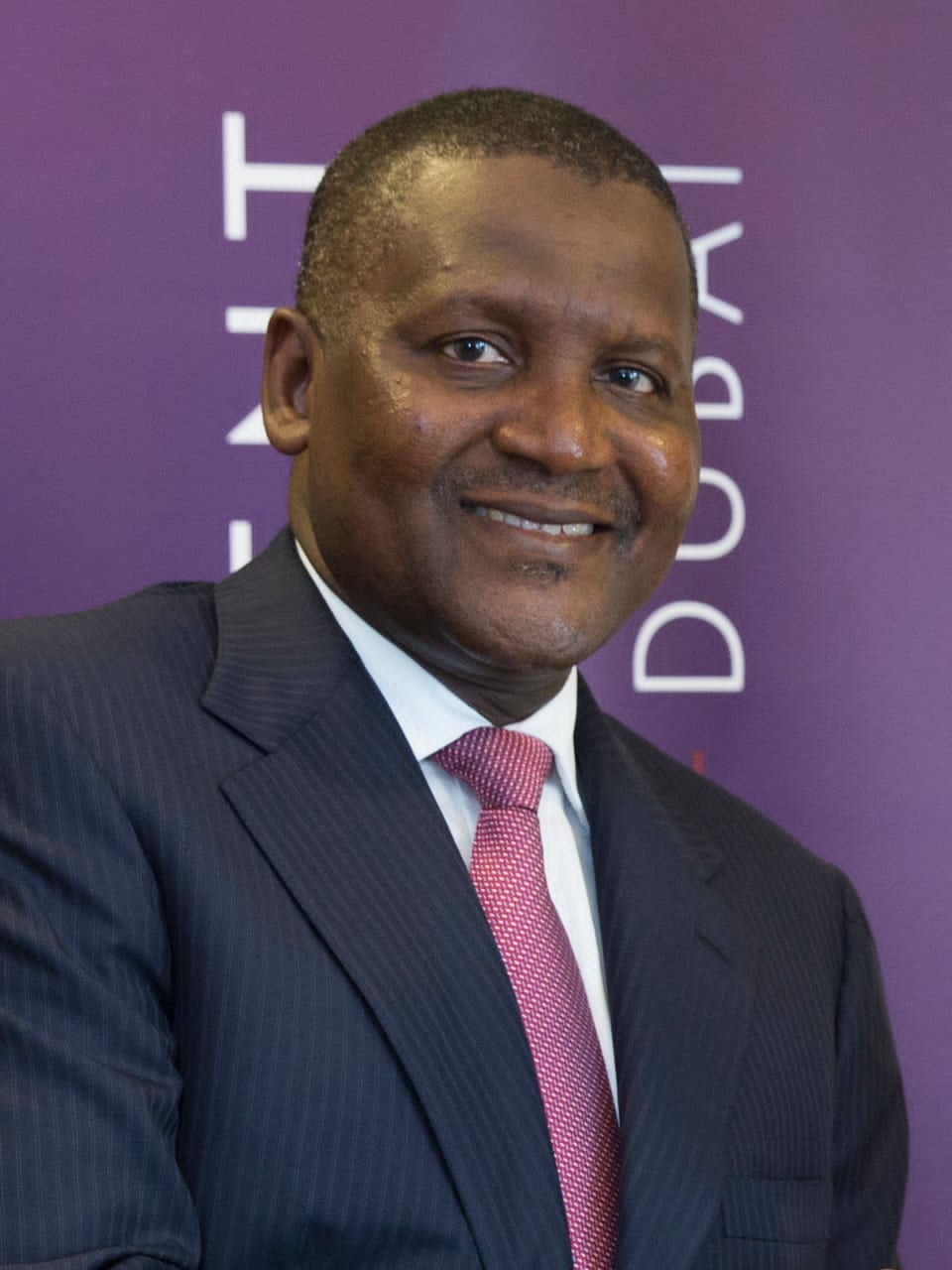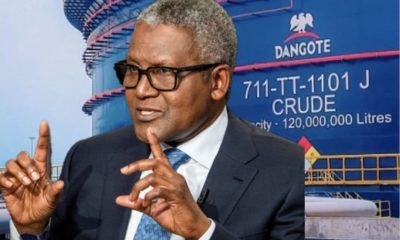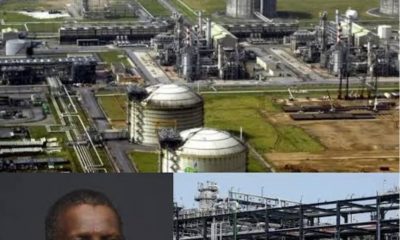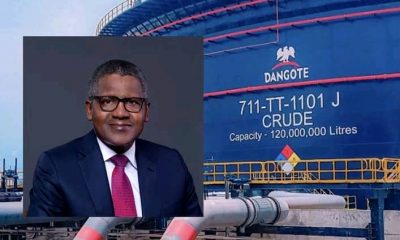Business
Dangote: The Monopoly We All Need By Mary Odoma

Dangote: The Monopoly We All Need
By Mary Odoma
There seems to be a huge partition between Nigerian industrialist Alhaji Aliko Dangote and other Nigerian economy drivers. His visionary gait and purposefulness are fixated on recreating the essentials required to prop up the depleting economic fortune of Nigeria amidst contending voices.
Since 1977, when he ventured into business, trading in agricultural commodities and engaging in business supplies such as sugar and cement, Alhaji Aliko Dangote has never looked back. In 1981, he incorporated his numerous businesses, which eventually became a conglomerate. Today, the Dangote Group of Companies is a household name in Nigeria and beyond.
The holding company’s interest became so massive that its positive economic impact within Nigeria and sub-Saharan Africa became profound, edging out numerous foreign products from the West African domestic market. A strong advocate of industrialization, Alhaji Dangote believes that dependence on the importation of finished products to Africa simply translates to the importation of poverty and the exportation of jobs.
So, when the idea of the Dangote refinery was first announced in 2013, it was indeed heartwarming news to Nigerians. Although construction of the world’s biggest single-train refinery began in 2017, there were prospects that its completion would end Nigeria’s energy crises and reliance on fuel importation.
In 2013, the refinery project was estimated to cost the Dangote Group a whopping $9 billion. However, by the time construction work began in 2017, the cost had risen to about $15 billion. Despite this disparity in estimated cost, the Dangote Group went ahead with the construction work, which was estimated to be completed in 2019. Regrettably, due to the COVID-19 pandemic, the completion date was further shifted, and the date for commissioning was scheduled for the first half of 2021, but the 2021 date could not work due to unforeseen circumstances.
In all, at commissioning in the second quarter of 2023, precisely on May 23, construction of the refinery had gulped nearly $20 billion. It is an understatement to assert that building an efficient oil refinery facility has been at the heart of the debate over energy, forex, and fiscal policies in Nigeria for the last 50 years. This is because Nigeria’s four government-owned refineries, with a cumulative capacity of about 445,000 barrels per day (bpd), have been moribund for decades.
This meant that Nigeria exports its oil in crude form and imports refined oil with scarce foreign exchange. The attendant implication, therefore, was the emergence of the fuel subsidy regime, which was bad for Nigeria’s economic prospects. The regime led to the worsening state of the nation’s budget deficits as Nigeria’s debt profile increased with gloomy economic growth indices.
Against this background, several analysts drew up conclusions that the backlash received by the Dangote Group for daring to embark on such a massive project was an attempt to monopolise the economic benefits of the oil sector. Those naysayers had labelled the magnificent single-train refinery complex as a needless monopoly.
They orchestrated attacks and employed subversive antics just because they felt that the coming onstream of the Dangote multi-billion-dollar single-train refinery complex, the largest in the world, would finally put an end to their sordid business activities, which have held the nation’s economic lifeline hostage for more than five decades.
These few individuals are the fuel subsidy racketeers who have had their hands soiled in humongous scale corruption, diversion of the nation’s resources from critical sectors of the economy, as well as sharing profits of such loots amongst themselves and cronies in an inequitable manner.
Good enough, the multi-million-dollar Dangote refinery is here to bring the Nigerian dream to fruition. The refinery would meet 100% of all refined products required in Nigeria and a surplus for export. Though designed to process Nigerian crude, the refinery can also process most other African crude grades as well as Middle Eastern Arab light and even US Light.
The target is that, with a capacity of 650,000 barrels of crude per day, 450,000 bpd will be dedicated to meeting Nigeria’s domestic requirement. This means a total rejuvenation of the nation’s economy. Although the refinery has started with the production of diesel and aviation fuel, the sorting news is that the waiting game is over, the jinx has been broken.
It is instructive to admit that the import of the Dangote refinery coming on stream at this time is beyond the potential positive changes Nigeria’s economic indicators would witness in a few months. The positive impact of the multi-billion-dollar refinery would ultimately reflect directly on Nigeria’s foreign exchange reserves by reducing the pressure on the nation’s balance of payment.
This means that under President Tinubu, Nigeria would save trillions of naira and billions of dollars. For instance, between 2022 to 2023 alone, Nigeria spent over $70 billion on the importation of petroleum products, fertilizer, and petrochemicals, according to Africa Economy Digest.
Whatever the perception may be, Nigeria is at a crossroads. The country’s gloomy economic indicators that have remained a burden over the years are set to fizzle out for the better as the massive Dangote single-train world’s largest refinery debuts in the oil and gas sector.
Unfortunately, the reactive response of subsidy racketeers almost swayed the government’s decision on policies concerning the sale of Nigerian crude to local refineries, but thank goodness, the tide has assumed a positive dimension with recent impressive turns of events.
The evolving trend in the petroleum sector is what Nigeria requires to move forward; significantly, the feared Dangote refinery monopoly is what Nigeria as a nation requires now to thrive economically. This assertion is made more profound because the multi-billion-dollar refinery would, aside from saving the naira, make available vital raw materials of a wide range for manufacturers in the plastic, pharmaceuticals, food, beverages, construction, and other industries with massive job opportunities.
Candidly, the Dangote refinery is an ambitious move that has highlighted Nigeria’s potential for economic self-reliance. The $20 billion single-train Dangote refinery was envisioned to revolutionize the Nigerian oil and gas sector. Expectedly, the journey has not been without the usual criticism, with people raising questions about the rationale behind embarking on such a massive project in a developing and tottering economy.
The aim was basically to demonize the good intentions of the Dangote Group and its vision for Nigeria’s future. The hurting criticism was targeted at labelling the Dangote Group as shrewd capitalists whose target is to monopolize the Nigerian oil-based economy and beyond. However, the Dangote Group’s objective is clear; its intentions are not ambiguous. It is rather a blessing to the nation with the sole aim of reducing Nigeria’s dependence on the importation of refined petroleum products.
By refining petroleum products domestically, the Dangote refinery aims to enhance energy sufficiency, creating jobs, and spurring economic growth. Dangote refinery stands as a testament to Nigeria’s industrial ambitions and the complex interplay of business strategy, economic policy, and national interest.
No doubt, the Dangote refinery would, in no small measure, offer dividends similar to those from the Nigerian Liquified Natural Gas (LNG) investment, which has consistently provided returns despite initial scepticism. Furthermore, aside from boosting economic activities in the country, there will be revenue accruing to the government through taxes, royalties, and levies as the refinery comes on stream.
At least 144 products out of about 6000 products will be extracted in the process of refining petroleum. This means the value chain of refined petroleum products is very long and can stimulate a lot of businesses. Also, the multi-billion-dollar refinery would serve as a foreign exchange earner.
Industry experts projected that Nigeria could spend up to $30 billion in one year if the country continues to rely on imported petroleum products, an outrageous amount that can cripple the nation economically. Therefore, to save the nation from drifting completely to the precipice, the multi-billion-dollar refinery will boost Nigeria’s foreign exchange rate stability through the export of refined products.
Succinctly put, the coming on stream of the Dangote refinery is a game-changer that Nigeria so needs at this time. The refinery would not only change the economic narratives in Nigeria but the entire continent of Africa. Aliko Dangote has turned the tide towards a prosperous future for the continent. Indeed, this is a monopoly we most need and desire.
Odoma is a public affairs analyst based in Abuja.
Business
Nigeria’s Inflation Drops to 15.10% as NBS Reports Deflationary Trend

Nigeria’s headline inflation rate declined to 15.10 per cent in January 2026, marking a significant drop from 27.61 per cent recorded in January 2025, according to the latest Consumer Price Index (CPI) report released by the National Bureau of Statistics.
The report also showed that month-on-month inflation recorded a deflationary trend of –2.88 per cent, representing a 3.42 percentage-point decrease compared to December 2025. Analysts say the development signals easing price pressures across key sectors of the economy.
Food inflation stood at 8.89 per cent year-on-year, down from 29.63 per cent in January 2025. On a month-on-month basis, food prices declined by 6.02 per cent, reflecting lower costs in several staple commodities.
The data suggests a sustained downward trajectory in inflation over the past 12 months, pointing to improving macroeconomic stability.
The administration of President Bola Ahmed Tinubu has consistently attributed recent economic adjustments to ongoing fiscal and monetary reforms aimed at stabilising prices, boosting agricultural output, and strengthening domestic supply chains.
Economic analysts note that while the latest figures indicate progress, sustaining the downward trend will depend on continued policy discipline, exchange rate stability, and improvements in food production and distribution.
The January report provides one of the clearest indications yet that inflationary pressures, which surged in early 2025, may be moderating.
Bank
Alpha Morgan to Host 19th Economic Review Webinar

Alpha Morgan to Host 19th Economic Review Webinar
In an economy shaped by constant shifts, the edge often belongs to those with the right information.
On Wednesday, February 25, 2026, Alpha Morgan Bank will host the 19th edition of its Economic Review Webinar, a high-level thought leadership session designed to equip businesses, investors, and individuals with timely financial and economic insight.
The session, which will hold live on Zoom at 10:00am WAT and will feature economist Bismarck Rewane, who will examine the key signals influencing Nigeria’s economic direction in 2026, including policy trends, market movements, and global developments shaping the local landscape.
With a consistent track record of delivering clarity in uncertain times, the Alpha Morgan Economic Review continues to provide practical context for decision-making in a dynamic environment.
Registration for the 19th Alpha Morgan Economic Review is free and can be completed via https://bit.ly/registeramerseries19
It is a bi-monthly platform that is open to the public and is held virtually.
Visit www.alphamorganbank to know more.
Business
GTBank Launches Quick Airtime Loan at 2.95%

GTBank Launches Quick Airtime Loan at 2.95%
Guaranty Trust Bank Ltd (GTBank), the flagship banking franchise of GTCO Plc, Africa’s leading financial services group, today announced the launch of Quick Airtime Loan, an innovative digital solution that gives customers instant access to airtime when they run out of call credit and have limited funds in their bank accounts, ensuring customers can stay connected when it matters most.
In today’s always-on world, running out of airtime is more than a minor inconvenience. It can mean missed opportunities, disrupted plans, and lost connections, often at the very moment when funds are tight, and options are limited. Quick Airtime Loan was created to solve this problem, offering customers instant access to airtime on credit, directly from their bank. With Quick Airtime Loan, eligible GTBank customers can access from ₦100 and up to ₦10,000 by dialing *737*90#. Available across all major mobile networks in Nigeria, the service will soon expand to include data loans, further strengthening its proposition as a reliable on-demand platform.
For years, the airtime credit market has been dominated by Telcos, where charges for this service are at 15%. GTBank is now changing the narrative by offering a customer-centric, bank-led digital alternative priced at 2.95%. Built on transparency, convenience and affordability, Quick Airtime Loan has the potential to broaden access to airtime, deliver meaningful cost savings for millions of Nigerians, and redefine how financial services show up in everyday life, not just in banking moments.
Commenting on the product launch, Miriam Olusanya, Managing Director of Guaranty Trust Bank Ltd, said: “Quick Airtime Loan reflects GTBank’s continued focus on delivering digital solutions that are relevant, accessible, and built around real customer needs. The solution underscores the power of a connected financial ecosystem, combining GTBank’s digital reach and lending expertise with the capabilities of HabariPay to deliver a smooth, end-to-end experience. By leveraging unique strengths across the Group, we are able to accelerate innovation, strengthen execution, and deliver a more integrated customer experience across all our service channels.”
Importantly, Quick Airtime Loan highlights GTCO’s evolution as a fully diversified financial services group. Leveraging HabariPay’s Squad, the solution reinforces the Group’s ecosystem proposition by bringing together banking, payment technology, and digital channels to deliver intuitive, one-stop experiences for customers.
With this new product launch, Guaranty Trust Bank is extending its legacy of pioneering digital-first solutions that have redefined customer access to financial services across the industry, building on the proven strength of its widely adopted QuickCredit offering and the convenience of the Bank’s iconic *737# USSD Banking platform.
About Guaranty Trust Bank
Guaranty Trust Bank (GTBank) is the flagship banking franchise of GTCO Plc, a leading financial services group with a strong presence across Africa and the United Kingdom. The Bank is widely recognized for its leadership in digital banking, customer experience, and innovative financial solutions that deliver value to individuals, businesses, and communities.
About HabariPay
HabariPay is the payments fintech subsidiary of GTCO Plc, focused on enabling fast, secure, and accessible digital payments for individuals and businesses. By integrating payments and digital technology, HabariPay supports innovative services that make everyday financial interactions simpler and more seamless.
Enquiries:
GTCO
Group Corporate Communication
[email protected]
+234-1-2715227
www.gtcoplc.com
-

 celebrity radar - gossips6 months ago
celebrity radar - gossips6 months agoWhy Babangida’s Hilltop Home Became Nigeria’s Political “Mecca”
-

 society6 months ago
society6 months agoPower is a Loan, Not a Possession: The Sacred Duty of Planting People
-

 society5 months ago
society5 months agoReligion: Africa’s Oldest Weapon of Enslavement and the Forgotten Truth
-

 news6 months ago
news6 months agoTHE APPOINTMENT OF WASIU AYINDE BY THE FEDERAL GOVERNMENT AS AN AMBASSADOR SOUNDS EMBARRASSING









